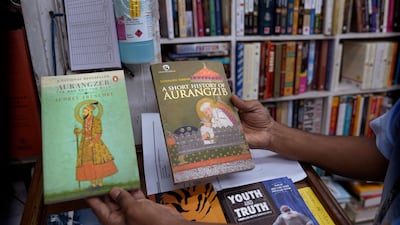Indian historians and academics have lashed out at the government after it removed chapters from school textbooks on Mughal rulers, deadly sectarian riots in which 1,000 Muslims were killed in 2002 and Hindu extremism that led to Mahatma Gandhi’s assassination.
The National Council of Education Research and Training, a government body that designs schools' syllabus and textbooks, has revised its programme for various classes for the coming term
But it has come under criticism from scholars for removing several important chapters from Indian history and political science books.
Some groups have long campaigned for rewriting India's medieval history and suppressing the country's Islamic past, as the officially secular country undergoes a rise of Hindu nationalism.
There have also been demands by the Hindu-right, associated with the government, to change the names of popular Mughal and Islamic monuments, such as the Taj Mahal and Qutub Minar which some believe were built on the ruins of Hindu temples.
Chapters removed
Chapters relating to kings, chronicles, Mughal courts, Islam, confrontation of cultures, as well as a two-page timeline detailing the milestones of Mughal emperors, and several pages on the Delhi sultanate, have been removed.
Mughals and other Muslim dynasties ruled parts of India for almost eight centuries and contributed immensely to its culture and history.
Simon Schama, a British historian, tweeted: “This is another preposterous war on history — the Mughals were a magnificent civilisation producing transcendent art, music, architecture.”
The government body has also removed chapters called ‘Democracy and diversity’, ‘Popular struggles and movement’, ‘Challenges to democracy’ and another on 'Politics in India since independence'.
Those on Nathuram Godse, the nationalist fighter and killer of Mahatma Gandhi, were also edited out.
Godse had alleged links with Rashtriya Swayamsevak Sangh (RSS), a paramilitary volunteer group that believes in the supremacy of Hindus. The group is closely linked to Prime Minister Narendra Modi’s Bharatiya Janata Party.
The chapter that described Godse as "the editor of an extremist Hindu newspaper who had denounced Gandhi as 'an appeaser of Muslims'" has been omitted.
One excerpt that said Gandhi was “particularly disliked by those who wanted Hindus to take revenge or who wanted India to become a country for the Hindus, just as Pakistan was for Muslims” has also been removed.
Paragraphs on the ban on the RSS after the assassination of Gandhi have also been left out.
Gujarat riots censored
All references to the deadly sectarian riots that rocked the western state of Gujarat in 2002 and left 1,000 people dead, mostly Muslims, when Mr Modi was the state chief minister, have also been omitted.
Likewise, social movements at odds with the Hindu nationalists will no longer be covered in schools.
They include the Chipko Movement — a forest conservation group started by villagers, particularly women, in northern Uttarakhand in 1973, and the Narmada, spearheaded by tribal farmers and environmentalists to save the river of the same name, in western and central India.
Chapters on Naxalism, an alliance of tribal peasants and anti-government Maoists, have been deleted.
Paragraphs on abuse of power and malpractices committed by former prime minister Indira Gandhi's government during the so-called Emergency period that was imposed for 21 months between 1975 to 1977 have also been removed.
The cancellation of elections, imprisonment of opposition leaders, suspension of civil liberties and press censorship took place during those two years.
Controversy
The National Council of Education Research and Training (NCERT) has justified the re-edited books as a “rationalisation” exercise with the aim of reducing the curriculum load on pupils and helping them to recover from the setbacks of the pandemic.
Dinesh Prasad Saklani, NCERT head, said: “This was a process suggested by experts as content had to be reduced due to the Covid pandemic. It is important to help the students and not impose the burden and the controversy has been taken out of proportion."
But such an attempt at justification has been dismissed by a number of historians, academics and opposition political leaders, who say it is an attempt by the right-wing government to erase the country’s history.
Since coming to power in 2014, Mr Modi’s Hindu-nationalist government has regularly changed Muslim-sounding names of places and cities in several states.
The government has changed the names of a dozen cities, as well as roads across the country.
Renowned Indian historian and author Syed Irfan Habib accused the government of sanitising history for the future generation.
“It is not unexpected," he told The National. "They want to create a history which is sanitised. They cannot have a history of their choice and keep characters of their likeness. This is not about Mughals alone. They have done away with the popular movements, Gujarat riots, the Emergency.
“It is going to be terribly awful for the future generations of the country. It is going to be dangerous because they will be a generation with a tunnel vision, people who’ll have no idea about a large number of things which have happened in the past. They will have a sanitised mind."


